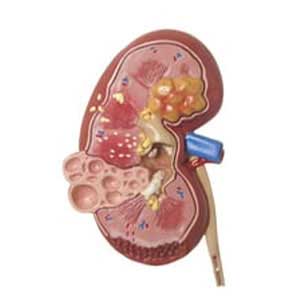End stage Renal Disease Treatment in Anantapur
End-stage renal disease represents a progressive condition, necessitating prompt renal replacement therapy to avert mortality. This stage, known as end-stage kidney disease (ESKD), signifies the final phase of chronic kidney disease. At this juncture, the kidneys are incapable of fulfilling the body's requirements. The primary function of the kidneys is to eliminate waste and surplus fluid from the body.
End-stage renal disease needing End stage Renal Disease Treatment in Anantapur manifests when the kidneys can no longer operate at a level sufficient for daily living. Typically, ESKD develops following a prolonged period of chronic kidney disease, during which kidney function may gradually decline over a span of 10 to 20 years prior to reaching the end stage. A viable treatment option includes kidney transplantation, in conjunction with various other therapeutic approaches.
Kidney transplant

A kidney transplant involves a surgical procedure to insert a healthy kidney into an individual suffering from kidney failure and hence needing to undergo Kidney Failure Treatment in Anantapur. Your physician will direct you to a transplant center, where you will undergo an assessment by the transplant team. They will evaluate your suitability for the procedure. Additionally, it may be necessary for you to adhere to a specific diet tailored for chronic kidney disease by Best Kidney Doctor in Anantapur, Dr. M. Surendra Babu. This diet may consist of:
- Consuming foods that are low in protein
- Ensuring adequate caloric intake while experiencing weight loss
- Restricting fluid intake
- Reducing the consumption of salt, potassium, phosphorus, and other electrolytes
Alternative treatments at Nephrology specialist hospital in Anantapur may vary based on your symptoms and could encompass:
- Additional calcium and vitamin D supplements. (It is advisable to consult your healthcare provider prior to initiating any supplementation.)
- Medications known as phosphate binders, which assist in maintaining phosphorous levels within a safe range.
- Interventions for anemia, including increased dietary iron, iron supplements or injections, erythropoietin injections, and blood transfusions.
- Medications aimed at regulating blood pressure.
In certain instances, individuals may experience significant electrolyte imbalances and elevated concentrations of specific waste products that are typically excreted by the kidneys. Additionally, patients may encounter issues related to fluid overload. It is advisable to consult the doctor immediately.
A physical examination will be conducted by Nephrologist in Anantapur, who will also request blood tests. The majority of individuals with this condition experience elevated blood pressure. Those suffering from end-stage renal disease (ESRD) typically produce significantly less urine, or their kidneys may cease urine production entirely. Without dialysis or a kidney transplant, end-stage kidney disease can result in death. Both treatment options carry associated risks, and the prognosis varies for each individual.
